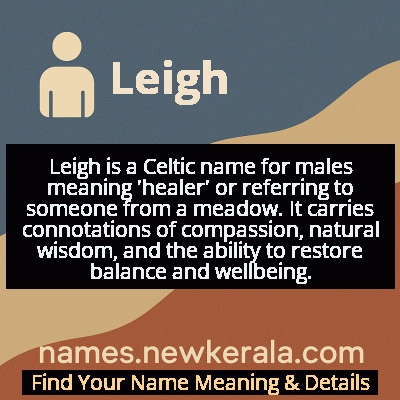Leigh Name Meaning & Details
Origin, Popularity, Numerology Analysis & Name Meaning of Leigh
Discover the origin, meaning, and cultural significance of the name LEIGH. Delve into its historical roots and explore the lasting impact it has had on communities and traditions.
Name
Leigh
Gender
Male
Origin
Celtic
Lucky Number
5
Meaning of the Name - Leigh
Leigh is a Celtic name for males meaning 'healer' or referring to someone from a meadow. It carries connotations of compassion, natural wisdom, and the ability to restore balance and wellbeing.
Leigh - Complete Numerology Analysis
Your Numerology Number
Based on Pythagorean Numerology System
Ruling Planet
Mercury
Positive Nature
Adventurous, dynamic, curious, and social.
Negative Traits
Restless, impatient, inconsistent, prone to indulgence.
Lucky Colours
Green, white.
Lucky Days
Wednesday.
Lucky Stones
Emerald.
Harmony Numbers
1, 3, 9.
Best Suited Professions
Sales, marketing, travel, entertainment.
What People Like About You
Versatility, charisma, adventurous spirit.
Famous People Named Leigh
Leigh Hunt
Poet and critic
Influential Romantic poet and founder of The Examiner newspaper
Leigh Whannell
Filmmaker and actor
Co-creator of the Saw and Insidious horror franchises
Leigh Halfpenny
Rugby player
Welsh international rugby star and British & Irish Lions tourist
Leigh Brackett
Science fiction writer
Pioneering female sci-fi author and screenwriter for The Empire Strikes Back
Name Variations & International Equivalents
Click on blue names to explore their detailed meanings. Gray names with will be available soon.
Cultural & Historical Significance
In Welsh culture specifically, Leigh and its variations were common among families with connections to herbal medicine and community care. The name's association with meadows also connected it to concepts of fertility, growth, and natural abundance. During the Celtic revival movements of the 19th and 20th centuries, Leigh gained renewed popularity as people sought to reconnect with their Celtic heritage. The name's enduring appeal across centuries demonstrates how it successfully bridges ancient traditions with modern sensibilities, maintaining its connection to both place and purpose in Celtic cultural identity.
Extended Personality Analysis
Individuals named Leigh are often perceived as compassionate, intuitive, and nurturing—qualities that align with the name's healing associations. They tend to be natural caregivers who possess a calm, steady presence that comforts others. Many Leighs demonstrate strong emotional intelligence and the ability to understand and support people through difficult times. Their meadow-dweller origins suggest a personality that values peace, natural surroundings, and harmony in relationships. They often exhibit patience and a methodical approach to problem-solving, preferring to heal conflicts rather than escalate them.
While generally gentle in nature, Leighs can also show remarkable resilience and inner strength when protecting or caring for others. Their balanced temperament makes them excellent mediators and trusted confidants in both personal and professional settings. The healing aspect of the name often manifests as a talent for making people feel understood and supported. Leighs typically approach life with quiet determination rather than aggressive ambition, preferring to build lasting relationships and create stable environments. Their connection to nature often translates into practical wisdom and an appreciation for simple, authentic experiences over material pursuits.
Modern Usage & Popularity
In contemporary times, Leigh remains a popular name choice, though its usage has evolved significantly. While traditionally male, it has become increasingly gender-neutral, particularly in English-speaking countries. The name maintains steady popularity in the UK, Australia, and North America, often chosen for its soft, approachable sound and natural connotations. Modern parents appreciate Leigh for its simplicity and connection to nature, while its Celtic origins appeal to those seeking names with cultural heritage. The name has seen a resurgence in recent years as part of the trend toward shorter, classic names that work well in professional contexts. It's frequently used as both a first name and middle name, and its spelling variations (particularly Lee) remain common across English-speaking populations. Social security data shows consistent but moderate usage, avoiding the extreme popularity spikes that can date a name to a specific generation.
Symbolic & Spiritual Meanings
Symbolically, Leigh represents healing, growth, and natural harmony. The meadow association connects it to themes of fertility, peace, and the cycle of life—places where nature flourishes and provides sustenance. As a healer symbol, it embodies restoration, compassion, and the ability to mend both physical and emotional wounds. The name carries connotations of bridge-building between different elements, much like a meadow serves as a transition between forest and field. In metaphorical terms, Leigh suggests someone who creates safe spaces for growth and renewal, offering shelter and care like a protected clearing in the woods. The symbolic meaning extends to representing balance—between strength and gentleness, tradition and progress, individual care and community wellbeing. This makes the name particularly resonant in times when people seek connection to nature and meaningful interpersonal relationships.

